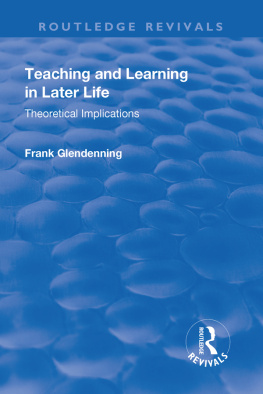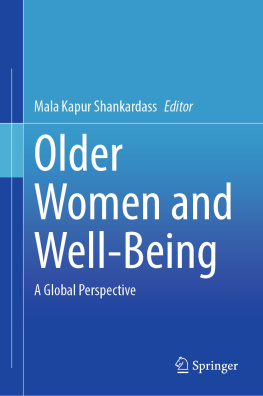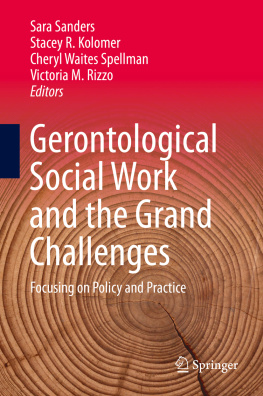TEACHING AND LEARNING IN LATER LIFE
STUDIES IN EDUCATIONAL GERONTOLOGY
Series Editor
Frank Glendenning
Honorary Senior Research Fellow, Centre for Social Gerontology,
Keele University and Department of Continuing Education,
Lancaster University
Also in this series:
Good Practice in the Education and Training of Older Adults
Alexandra Withnall and Keith Percy
Learning and Cognition in Later Life
Edited by Frank Glendenning and lan Stuart-Hamilton
Changing Concepts of Retirement: Educational implications
Edited by Joanna Walker
Teaching and Learning in Later Life
Theoretical implications
FRANK GLENDENNING
with contributions from
SANDRA CUSACK
ROBERT ELMORE
CHRIS PHILLIPSON
ALEXANDRA WITHNALL
First published 2000 by Ashgate Publishing
Reissued 2018 by Routledge
2 Park Square, Milton Park, Abingdon, Oxon OX14 4RN
711 Third Avenue, New York, NY 10017, USA
Routledge is an imprint of the Taylor & Francis Group, an informa business
Copyright Frank Glendenning 2000
All rights reserved. No part of this book may be reprinted or reproduced or utilised in any form or by any electronic, mechanical, or other means, now known or hereafter invented, including photocopying and recording, or in any information storage or retrieval system, without permission in writing from the publishers.
Notice:
Product or corporate names may be trademarks or registered trademarks, and are used only for identification and explanation without intent to infringe.
Publishers Note
The publisher has gone to great lengths to ensure the quality of this reprint but points out that some imperfections in the original copies may be apparent.
Disclaimer
The publisher has made every effort to trace copyright holders and welcomes correspondence from those they have been unable to contact.
A Library of Congress record exists under LC control number: 00132588
ISBN 13: 978-1-138-72189-0 (hbk)
ISBN 13: 978-1-315-19395-3 (ebk)
Contents
Chris Phillipson
Robert Elmore
Sandra Cusack
Alexandra Withnall
Sandra Cusack is Gutman-Gee Research Fellow in Educational Gerontology, Gerontology Research Centre and Lecturer in Third Age Learning, Faculty of Education, Simon Fraser University, Vancouver, Canada.
Robert Elmore is Emeritus Fellow of Kellogg College and formerly University Lecturer in Public Administration, University of Oxford, United Kingdom.
Frank Glendenning is Honorary Senior Research Fellow in Social Gerontology, Keele University and in Continuing Education, University of Lancaster, United Kingdom and a Joint Editor of Education and Ageing.
David James is Dean of Associated Institutions and formerly Professor of Educational Studies, University of Surrey, Guildford, United Kingdom. He was founder Chair of the Association for Education and Ageing.
Chris Phillipson is Professor and Director of the Centre for Social Gerontology, Keele University, United Kingdom.
Alexandra Withnall is non-clinical Lecturer in Gerontology, Postgraduate Medical School, Keele University, United Kingdom. She is current chair of the Association for Education and Ageing.
This fascinating volume brings together the contributions of some of our most able and productive thinkers currently active in the field of teaching and learning in later life. They are drawn from fields as diverse as educational gerontology, social gerontology, public administration and continuing education. The juxtaposition of their contributions together with the skilful, integrative editing of Frank Glendenning has produced a feast of concepts and ideas from which all concerned with older learners must surely benefit.
Most of the contributors are active members of the Association for Education and Ageing and in that forum are no strangers to interdisciplinary debate. This is much in evidence in the way in which each author has drawn widely and freely on the thoughts of others. Such cross-fertilization helps in no small way in moving forward this emerging field of study, research and practice.
Although this book emphasizes particularly the moral, social, historical and educational perspectives of the key concepts running through it, those of us coming from other backgrounds (particularly the life sciences) will find our own ideas illuminated by and hopefully illuminating the questions which are raised.
Ageing, as the books title suggests, is one such central theme. To the biologist, ageing refers to changes which occur to an organism as time passes. It is, therefore, a life-long process beginning at conception. It has dimensions both of growth and development and of decline and deterioration. When we are young growth dominates. As we get older the balance inevitably changes but at different rates, in different ways, in different individuals, in different circumstances. Such a dynamic view of a continuum for me is very helpful in exploring and making sense of the range of perspectives on the issues discussed. An explicit statement of the value of this approach comes on emphasizes the crucial role of the environment when he explores the concept of ageing as a socially constructed event, while Withnall in her excellent account of the life-course approach relates the ideas of learning choices to interaction between older people and the world around them.
Cusack in in talking about Freires `banking concept of education illustrates this well by considering that often older learners are being domesticated and, so inhibited from realizing their full potential of being human.
The second major theme of the book is of course learning and teaching and again interdisciplinary considerations are extremely profitable. Learning is a fundamental biological and psychological process. All living creatures, in order to survive, must interact with their surroundings. Eating and breathing are essential for physical life. Taking in experiences and responding to them, activities in which learning is central, are essential for psychological well-being. Learning is the process by which we are sustained and developed through experience sand it occurs more or less continuously in ever part of our lives.
Each of the chapters in its own way examines the importance of a rich stimulating environment to promote mental health and the fact that we maintain our competence to benefit from such stimulation as we age. What is often lacking is the opportunity for many older people to be so sustained and stimulated, resulting in their demotivation, disempowerment and general disadvantage. Cusack in and Glendenning in the final chapter are key contributions in this area.
Where does teaching come into this debate? ) very helpfully discusses the place of education for older adults within the continuum of life-long learning. She and others implicitly reinforce the idea that creating your own learning opportunities are at least as important as those created for you by a teacher or adult educator. Perhaps this is a reflection of the point made by Glendenning that those who enjoyed successful education earlier in life are likely to do so again later on.
A final general point which this book brings home to me is the importance of motivation. We all, whatever our ages, have a range of needs from those essential for basic biological survival to those concerning security, social acceptance, recognition and self-fulfilment. We try to produce behaviour to satisfy these needs. If we cannot then we are thwarted feeling insecure and threatened, rejected, devalued, unfulfilled. In a perfect world it would be possible for us each to satisfy our own needs without frustrating others. In reality, however, this is rarely the case particularly when more powerful people relate to less powerful. The teacher who satisfies his needs for security and status by denigrating and threatening his pupils, or the health care professional operating in a manner unconducive to the psychological comfort of the patient are examples of such social friction which have been partially overcome by making the less powerful person not so much a passive recipient but more an active participant in the relationship. Perhaps this same concept will be helpful in ameliorating some of the frustrations of older people when their needs are perceived inappropriately by others be they politicians, professionals or just people from other age groups. In most chapters one can pick out examples of older people being frustrated by others who through lack of knowledge and understanding, time or opportunity are putting their own needs first and ignoring the needs of those to whom they are relating. But putting this to rights however might well involve reconstructing human relationships in our society in general.





